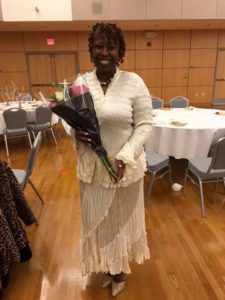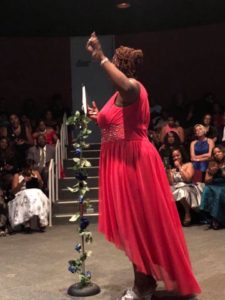 Our October 2019 Shero of the Month is Alicia Diggs of Greensboro, North Carolina. Alicia is PWN’s North Carolina state lead, a leader of the North Carolina Organizing for Power team, a member spokesperson, and appeared in two videos in the PWNCares series. This fierce advocate is also an author and recently completed her PhD in public health education. “Alicia is truly someone who lights up the whole room with her smile,” said Jennie Smith-Camejo, PWN’s communications director, “but don’t think for a minute that she came to play. She’s incredibly warm and compassionate, but she is serious about making change. She knows very well how to advocate for her community and for herself. One of the things that has most impressed me in my work with Alicia is her unwavering commitment–to making things better for others, but also to learning as much as she can and putting what she learns into action. That’s so refreshing and makes her strong in everything she does.”
Our October 2019 Shero of the Month is Alicia Diggs of Greensboro, North Carolina. Alicia is PWN’s North Carolina state lead, a leader of the North Carolina Organizing for Power team, a member spokesperson, and appeared in two videos in the PWNCares series. This fierce advocate is also an author and recently completed her PhD in public health education. “Alicia is truly someone who lights up the whole room with her smile,” said Jennie Smith-Camejo, PWN’s communications director, “but don’t think for a minute that she came to play. She’s incredibly warm and compassionate, but she is serious about making change. She knows very well how to advocate for her community and for herself. One of the things that has most impressed me in my work with Alicia is her unwavering commitment–to making things better for others, but also to learning as much as she can and putting what she learns into action. That’s so refreshing and makes her strong in everything she does.” She learned she was HIV-positive in 2001, three months before her wedding. After disclosing to her fiance her results, she decided to proceed with the wedding, thinking no one else would ever want a relationship with her. However, six months into the marriage, her husband disclosed that he knew he was living with AIDS and didn’t care that he had transmitted the virus to her. Upon hearing those words, naturally her immediate thought was to cause him bodily harm. She said, “I truly wanted to kill him, but God had different plans for me.”
Post-diagnosis, Alicia would have to deal with the anger she felt and the sadness that eventually led to a depression and her withdrawing from loved ones. She said, “It took counseling, support groups as well as support from friends and family to get through the debilitating belief of feeling tainted, set apart and ‘diseased’.” Alicia divorced her husband and waited four years before committing to another relationship because she was afraid of being intimate. She said, “Though my new partner was accepting of me, I was still very hesitant to be intimate, and I stigmatized myself.”
Though Alicia was diagnosed in 2001, she did not begin antiretroviral medication until 2011. Because she was observed to be an HIV elite controller, her provider suggested she did not need medication to fight the virus because it was not replicating as is the case with non-elite controllers. Her labs consistently showed her CD4-cell (T-cell, or helper cell) count at 740-1200. She said, “I did not start antiretroviral medication because I was always told since my diagnosis that as long as my CD4 count was 500 and above, then I did not have to take medication.” She still monitored her lab work and said, “Over time, as I noticed my CD4 levels dropping, I began my own research on medications and discussed treatment with my physician. Being busy with work, school, and advocacy, it was suggested that a 1-pill daily regimen would work great for me.”
 After she started treatment, Alicia began to advocate for the needs of people living with HIV. Her advocacy has netted her multiple awards, as well as a steady stream of invitations to educate others, especially at universities; she is also a Board member at the North Carolina AIDS Action Network. As an advocate, she continues to speak out against the stigma that people living with HIV face.
After she started treatment, Alicia began to advocate for the needs of people living with HIV. Her advocacy has netted her multiple awards, as well as a steady stream of invitations to educate others, especially at universities; she is also a Board member at the North Carolina AIDS Action Network. As an advocate, she continues to speak out against the stigma that people living with HIV face. When asked how stigma has shown up in her life and the lives of her loved ones, she said, “Stigma has shown up multiple times in my life from people I knew such as family members, a medical provider, and strangers. I have even been guilty of stigmatizing myself.” The worst came from her mother who at the time was not knowledgeable of HIV transmission. Alicia remembered her mom being uncomfortable in her presence, so she “flooded her with information about HIV.” She said, “I had a choice to be completely sad and angry with my mother or not even speak to her, but you only get one mother. The love I have for my mother was so much bigger than the stupid stigma and lack of knowledge.” She continues to be grateful that her children were never impacted by the stigma attached to her serostatus. Though the family started with no understanding of HIV, Alicia did not let that deter her. She said, “People in the family were always whispering and looking at me strangely, but once I started speaking out about my life as a woman living with HIV and getting recognized, my family could only say that I was brave and they are proud of me.”
You can learn more about Alicia’s story in her book, Standing On My Healing: From Tainted to Chosen.
 Having to disclose one’s status can prevent people living with HIV from having meaningful intimate relationships. Alicia provided a few steps that may help to combat the stigma that people living with HIV face when dating.
Having to disclose one’s status can prevent people living with HIV from having meaningful intimate relationships. Alicia provided a few steps that may help to combat the stigma that people living with HIV face when dating. 1. Acknowledge the fact you are living with a manageable chronic illness that does not define you.
2. Educate yourself on the virus, so you can answer questions that may arise before being intimate with a partner.
3. Be patient with yourself and your partner when disclosing. There may require an adjustment period.
4. If necessary, have a trusted loved one with you while you disclose.
Alicia concluded by saying, “The main thing to know and remember is that you are worthy, phenomenal and more than enough.”


